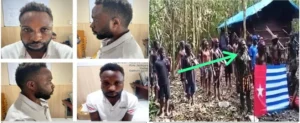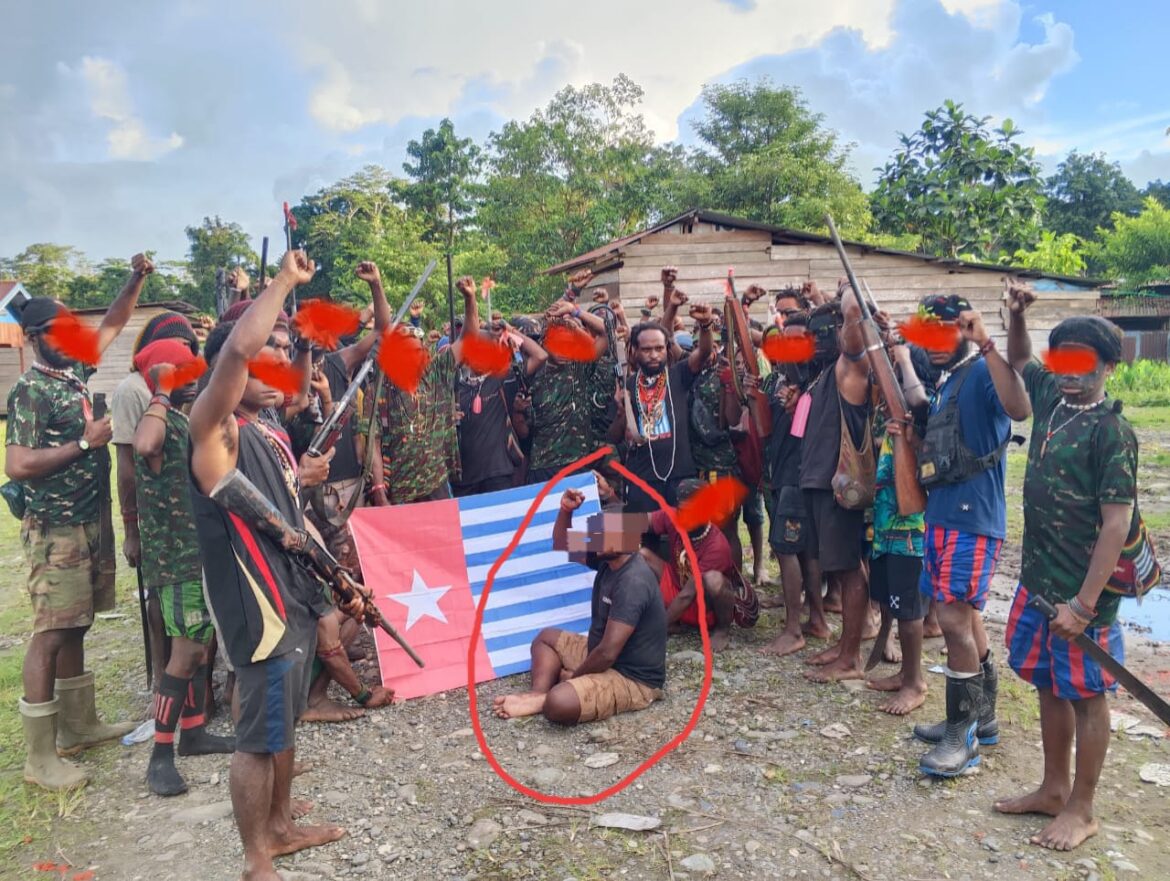As the sun set behind the jagged hills of Yahukimo in Papua, a chilling silence gripped the community. Word spread quickly—a local Papuan man (circled in red in the picture above) had been executed in cold blood on 6 September 2025. Not by unknown assailants or foreign actors, but by fellow Papuans. His alleged crime? Being a “spy” for the Indonesian government based on information from TPNPB OPM spokesperson Sebby Sambom.
Behind the trigger was Kodap XVI Yahukimo, a regional combat unit of the West Papua National Liberation Army–Free Papua Organization (Tentara Pembebasan Nasional Papua Barat–Organisasi Papua Merdeka, or TPNPB–OPM), led by the infamous separatist figure Kopi Tua (Penihas) Heluka. This wasn’t an isolated act of violence—it was a cold and calculated execution, part of a pattern of increasing aggression by armed separatists who claim to fight for freedom, yet perpetuate fear and chaos among the very people they vow to protect.
This recent execution exposes not only the brutality of armed separatist operations in Papua but also the moral crisis at the heart of the conflict. It shines a spotlight on how the narrative of “freedom fighting” is being used to justify horrific acts of extrajudicial killings, civilian intimidation, and human rights violations.
The Killing in Yahukimo: Justice or Terror?
The victim, a native Papuan man whose name was not released for his family’s safety, was accused by TPNPB–OPM of being an informant for the TNI–Polri (Indonesian National Armed Forces and Police). No evidence was presented, and no trial was conducted. He was executed publicly by the group.
In an official statement released by the armed separatist faction, Kopi Tua Heluka justified the killing as “disciplinary action” and warned that anyone cooperating with Indonesian authorities would face the same fate. The message was clear: intimidation and death await those who oppose them—even civilians.
This act is not only morally abhorrent but also stands in stark violation of international human rights law. Executing unarmed civilians without due process is a war crime. It undermines any legitimacy the group claims in its struggle for Papuan independence and raises urgent questions about the safety of non-combatants in conflict zones.
Ironically, the OPM often accuses the Indonesian government of human rights abuses—a claim that has drawn attention internationally. Yet, with each act of violence like this one, their own hypocrisy becomes undeniable. TPNPB-OPM cannot claim to be a defender of indigenous rights while murdering indigenous people.
Who Is Kopi Tua Heluka?
To understand the broader implications of the killing, one must look at the man behind the bloodshed.
Kopi Tua Heluka, a self-declared major in the TPNPB–OPM structure, is no stranger to violence. Over the past several years, he has become a symbol of militancy in Yahukimo and a wanted man by the Indonesian government for a string of serious crimes.
On 4 November 2022, Heluka’s group was responsible for the brutal murder of Pratu (First Enlisted Soldier) Eka Johan Kaise, a young Indonesian soldier in Yahukimo from Military District Command (Kodim) 1715-07/Kenyam. The soldier was ambushed at a military post, stabbed multiple times, and left to die—a statement of power from the separatist cell.
Just weeks later, on 29 November 2022, Kopi Tua led an armed assault on the Yahukimo Police Station, claiming to have killed two police officers, including Brigadir Usdar, and injured many others. The attack, carried out with military-grade weapons, was aimed at demonstrating their capability to resist state control.
On 19 May 2023, Indonesian officers from Cartenz Task Forces successfully arrested Heluka in Yahukimo, and the court sentenced him to 13 years in prison on 7 February 2024. But on 27 February 2025, Kopi Tua Heluka made headlines again when he escaped from Wamena prison in a daring jailbreak involving six other inmates. Using a rope and bolt cutters, they slipped past security during an outdoor activity and disappeared into the forest. Just days later, the TPNPB–OPM announced that Heluka had returned to Yahukimo and resumed command of his unit.
Far from being rehabilitated or neutralized, Heluka has become more dangerous—emboldened by his freedom, celebrated by his followers, and unafraid to inflict terror.

Terrorizing Their Own People
Perhaps the most disturbing element in this narrative is the choice of victim—a fellow Papuan.
This was not a soldier, not a police officer, and not a representative of the Indonesian state. This was a civilian—someone who likely shared the same language, skin color, and cultural roots as his executioners.
The logic of the killing, if it can be called that, was based on suspicion alone. In regions like Yahukimo, where state presence is limited and separatist militias maintain de facto control over remote villages, accusations of collaboration can be fatal. A whisper is enough. A glance. A rumor.
This culture of fear has fragmented communities, eroded trust, and stifled civil discourse. Parents fear sending their children to school. Farmers fear walking their land. Journalists are threatened into silence. And in the shadows, armed men dictate who lives and who dies—all under the banner of “freedom.”
A Moral Contradiction
For years, the TPNPB–OPM has attempted to garner international sympathy by claiming they are the victims of state-sponsored oppression. While there are indeed historical grievances and legitimate calls for justice and equality in Papua, the use of terror to make a political point delegitimizes the very movement.
By executing civilians, attacking police stations, and murdering soldiers, the group has crossed the line between insurgency and criminality. It is no longer a struggle for independence—it is a campaign of violence without restraint.
And unlike the Indonesian security forces—who operate under state law, human rights oversight, and constitutional accountability—groups like TPNPB-OPM operate in a legal and moral vacuum.
The Role of Security Forces in Papua
In the face of this violence, the presence of Indonesian security forces in Papua is not only justified but also necessary. The claim that TNI–Polri are invaders or colonizers, as often framed by separatists, ignores the central truth: their duty is to protect all Indonesian citizens, including Papuans, from armed threats.
Military and police personnel are often stationed in high-risk areas not to exert control, but to safeguard civilians from militia activity. Their presence deters further violence, prevents territorial takeover by armed groups, and ensures that humanitarian aid, development, and education can continue in otherwise unstable regions.
Indeed, many Papuan civilians—particularly those in rural villages—welcome the protection of state forces when faced with the fear of being labeled spies or sympathizers by separatists.
What Comes Next?
The situation in Papua remains volatile. As long as armed separatist groups like the TPNPB–OPM continue to carry out extrajudicial killings, robbery, kidnap, rape and violent ambushes, peace will remain elusive. There is no future for Papua in violence.
The solution lies not in bloodshed, but in justice. In dialogue. In restoring trust between communities and the state. In accountability—not only for Indonesian authorities but for separatist actors as well. If Papua is to move forward, the rule of law must prevail over the rule of the gun.
Conclusion
For the TPNPB–OPM and its sympathizers, the question is simple but profound: What kind of freedom are you fighting for if your path is paved with the blood of your own people?
True liberation cannot be built on fear. It cannot be earned by executing unarmed men. It cannot be claimed by leaders like Kopi Tua Heluka, whose record reflects not a struggle for justice, but a reign of terror.
If peace and autonomy are ever to be realized in Papua, the violence must end—and it must end on all sides.


